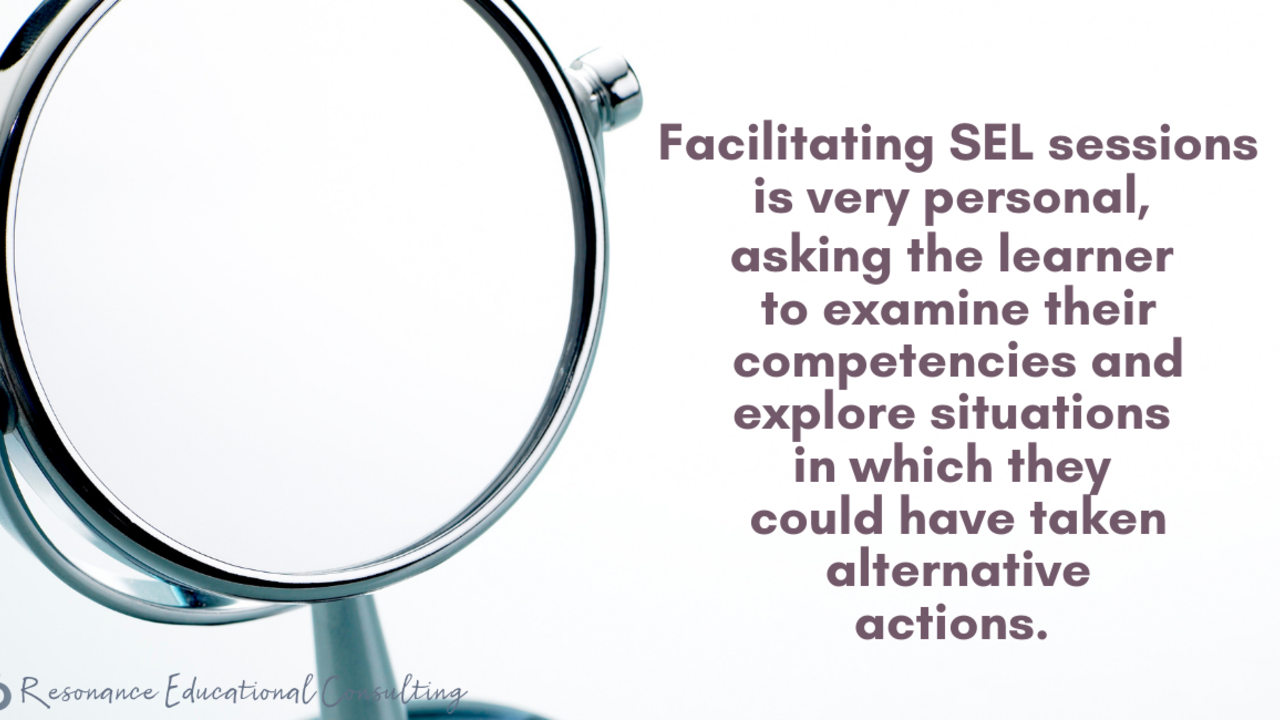003: A Thin Line in SEL Facilitation
Nov 17, 2020
I have long been a practitioner of social emotional learning (before it was called SEL) in my high school social studies classroom and implicitly facilitated the development of these skills. By year eight, I began to explore SEL's role in my personal life and address it in my classroom explicitly. It was around this time that I shifted towards also facilitating SEL with adult learners. As an instructional tech and curriculum coach for five years with a district, and as a professional learning facilitator with a company specializing in differentiated instruction, I can attest that leading sessions on SEL are very different from leading sessions on other pedagogical topics.
Facilitating SEL sessions for adults (and for students) is very personal, asking the learner to examine their own competencies and explore past situations in which they could have taken alternative actions. Facilitators must be willing to investigate our strengths and acknowledge our areas for growth and improvement. Due to time constraints and pressure to teach content and academic skills, educators ask for the SEL strategies to implement without knowing the full foundation of SEL and examining how it fits their personality, teaching context, and needs.
Rich, deep professional learning on SEL will reach the core of personality, authenticity, integrity, diversity, and equity. These are areas that require ongoing and heartfelt dedication to achieve consistent competency. Facilitators of social emotional learning must spend time examining and deepening their own competencies so SEL authentically becomes part of who they are and what they do, enabling them to model it for learners. All educators can develop the expertise to facilitate meaningful SEL sessions if they are willing to embrace the personal and professional journey towards ever-improving social and emotional skills development.
While coaching administrators in SEL facilitation, a common concern discussed is the fear of oversharing personal stories while leading a session. In fact, on several occasions, I’ve been witness to facilitators sharing deeply personal information about their families and their past experiences only to have the session flipped from a learning session to a therapy session for the presenter. The facilitator intended to connect with the audience and to model transparency, authenticity, and vulnerability. Storytelling is a profound way in which to communicate with others. Sharing our story often gives people permission to open up and share their experiences because it binds us with a sense of unity and understanding.
Moving Forward
To help avoid falling into this trap, here are a few guidelines I utilize in my preparation and facilitation:
(1) Identify areas within your presentation where you are considering sharing a story or personal experience. Pre-select the stories you want to share. For each account, answer the following questions:
a. What is the lesson of the story? What do you hope your audience will remember from this story? What is the purpose of telling this particular story (maybe even above all others)?
b. How is this story directly related to the goals and objectives of the session? Does it add value to the content, or is it meant to grab an emotional response? (FYI: I prefer to have my stories relate to a session learning as I feel resentful when I realize others’ purposely shared only to pull an emotional response from me.)
c. Is this a story or experience you have resolved and moved beyond? I would not recommend sharing a situation you are still currently experiencing. Sometimes we do not realize the depths of our emotions until we start to speak. Once you begin to share a story as a facilitator, it is akin to shaking out a feather pillow; it is challenging to backtrack and put all the feathers back into the bag.
d. Is this a story that a broad audience deserves to hear? Even though we are facilitators of learning, we also have human experiences, and not everyone is deserving of our stories.
(2) Avoid sharing impromptu experiences that arise while you are presenting. Instead, jot them in a notebook or send yourself an audio message about the experience when you have a “down” moment. Revisit the stories in your notebook or audio files when you have time and filter them through questions a-d above!
Final Thoughts
I still keep a small notebook where I write down personal experiences directly related to an SEL competency. It amazes me what I remember when I least expect it - and I find that I need to text or write it down to return to it for closer examination using the questions presented above!
It also takes time and practice to determine precisely how much detail to include (or delete) when incorporating a story. It is beneficial to have a trusted thought partner with whom you can practice and provide kind and honest feedback to help you grow as a facilitator.

